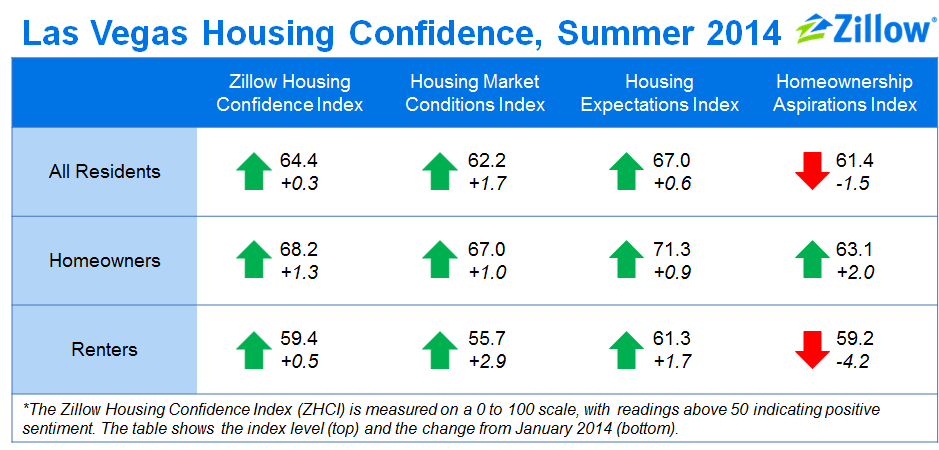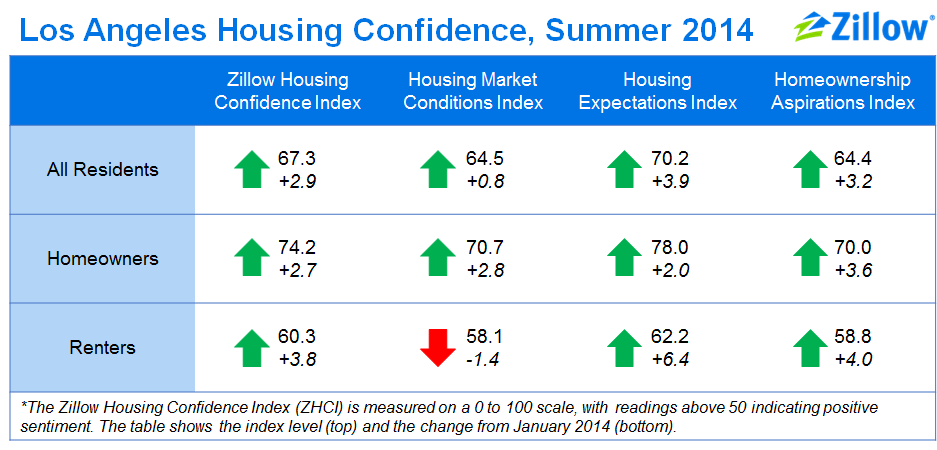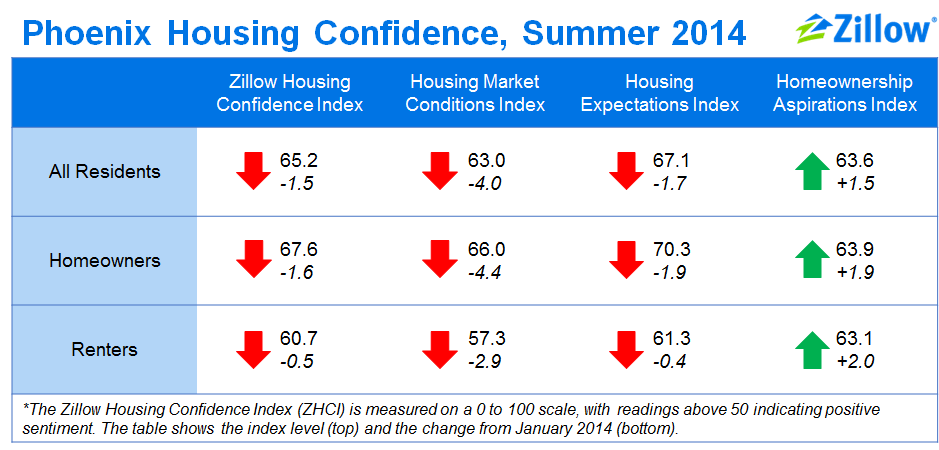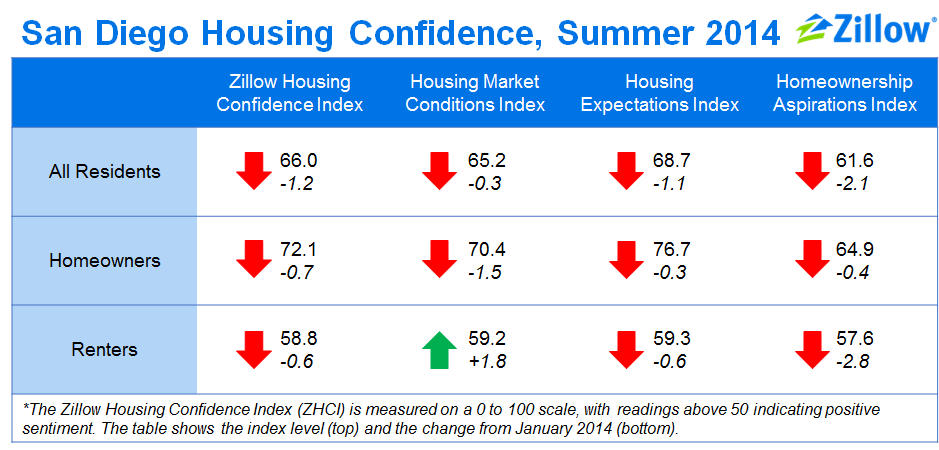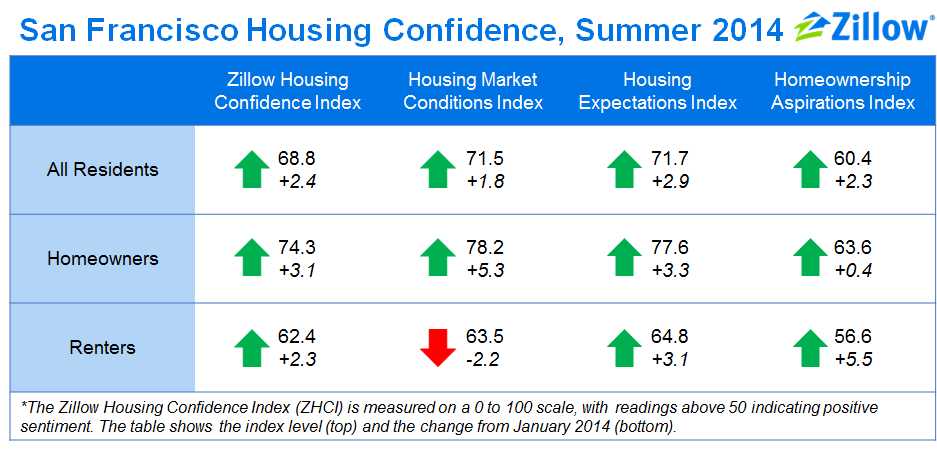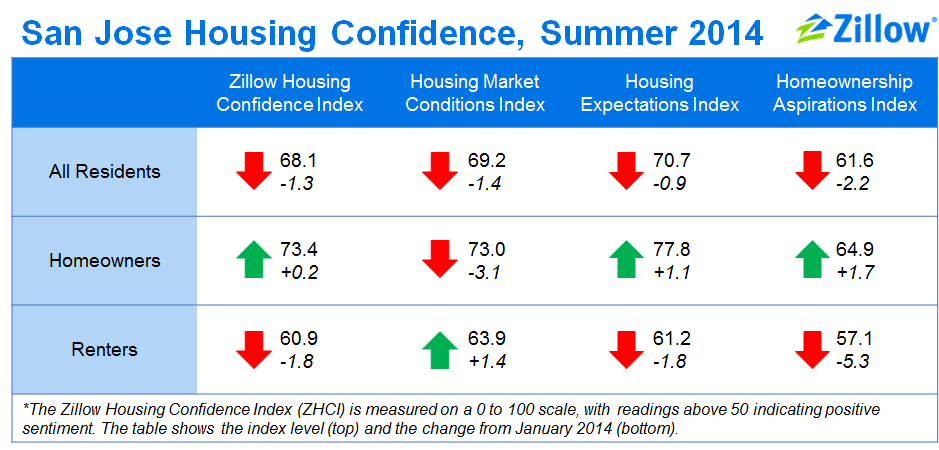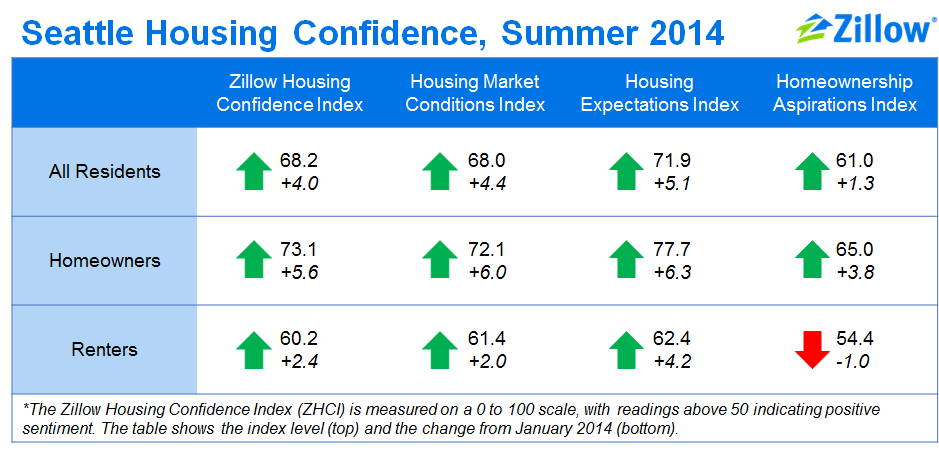This post is part 4 in a four-part series on housing confidence across the United States
Part 1, focused on the Northeast, can be found here.
Part 2, focused on the South, can be found here.
Part 3, focused on the Midwest, can be found here.
Housing market confidence improved in the West as the year progressed, and home owners in the West remain the most confident in the country, according to the most recent Zillow Housing Confidence Index.
The Zillow Housing Confidence Index, sponsored by Zillow and developed and administered by Pulsenomics LLC, offers unique insight into homeowners’ and renters’ intentions and attitudes about the housing market, and provides a gauge of housing market health looking forward. It is based on more than 10,000 interviews in 20 real estate markets.
The ZHCI is measured on a 0 to 100 scale, with readings above 50 indicating positive sentiment. The headline index is comprised of three sub-indices:
- The Housing Market Conditions Index (HMCI), which measures prevailing market trends and buying/selling conditions.
- The Housing Expectations Index (HEI), measuring expected changes in home values, home affordability and the value of homeownership.
- The Homeownership Aspirations Index (HAI), which measures household home-buying plans and attitudes toward the social value of homeownership.
Below is a detailed breakdown of homeowner and renter confidence in the Las Vegas, Los Angeles, Phoenix, San Diego, San Francisco, San Jose and Seattle metros.
Renters Feeling Unlucky in Las Vegas
- Housing market confidence edged up in Las Vegas, with confidence among owners improving more dramatically than among renters.
- About 16 percent of Las Vegas renters said they expect to buy a home within the next year, which would translate into 140,000 new homeowners.
- Young adults in Las Vegas are slightly more skeptical about the financial benefits of homeownership, but are strong believers in its social benefits.
Housing market confidence increased slightly in the Las Vegas metro area over the year, with the sub-indices for renters and homeowners both showing modest improvement. The sub-indices were mostly higher, although the Homeownership Aspirations Index for renters and owners moved in opposite directions, with renters feeling less confident about their future homeownership prospects.
Survey respondents said they expect home values to increase by about 3.1 percent over the next year in the Las Vegas metro area. Zillow’s September 2014 Home Value Forecast projects a 6.1 percent increase over the next year compared to a 13.4 percent increase over the past year. When asked to estimate how much home values increased over the past year, survey respondents said 3.1 percent, on average. More housing data for the Las Vegas metro area are available here.
Almost two-thirds (63 percent) of Las Vegas-area renters said they are “confident” or “somewhat confident” that they will eventually be able to buy a home. Among young adults age 18 to 34, the share is much higher, at 80 percent. Over the next year, 16 percent of renters said they expect to buy a home. If these plans come to fruition, it would translate into about 140,000 new homeowners in the Las Vegas metro area.[1] An additional 20 percent of renters said they plan to buy a home one to two years in the future, which would translate into about 140,000 new homeowners between mid-2015 and mid-2016.
Las Vegas millennials (age 18 to 34) are slightly less convinced than Generation X (age 35 to 49) of the financial benefits of homeownership, but are more apt to believe in the social benefits. Only 61 percent of millennials said they agree that buying a home is the best long-term investment a person can make, versus 64 percent of Generation X. But among millennials, 70 percent said they agree that owning a home is necessary to live “the good life” and “the American dream,” compared to 50 percent of Generation X.
Stars Aligning for Homeowners in Los Angeles
- Housing market confidence has improved in Los Angeles.
- About 8 percent of Los Angeles renters said they expect to buy a home within the next year, which would translate into 480,000 new homeowners.
- Young adults in Los Angeles are very optimistic about the financial returns to homeownership, despite coming of age during a period of substantial home value volatility.
Housing market confidence has risen in the Los Angeles metro area, with both sub-indices for renters and homeowners showing improvements. Among all 20 metro areas surveyed, homeowners in Los Angeles had the second-highest confidence, just behind San Francisco homeowners.
Survey respondents said they expect home values to increase by about 4.1 percent over the next year in the Los Angeles metro area. Zillow’s September 2014 Home Value Forecast projects a 3 percent increase over the next year, compared to an 8.3 percent increase over the past year. When asked to estimate how much home values increased over the past year, survey respondents said 5.4 percent, on average. More housing data for the Los Angeles metro area are available here.
Almost two-thirds (61 percent) of Los Angeles-area renters said they are “confident” or “somewhat confident” that they will eventually be able to buy a home. Among young adults age 18 to 34, the share is much higher, at 82 percent. Over the next year, 8 percent of renters said they expect to buy a home. If these plans come to fruition, it would translate into about 480,000 new homeowners in the Los Angeles metro area. An additional 24 percent of renters said they plan to buy a home one to two years in the future, which would translate into about 1.3 million new homeowners between mid-2015 and mid-2016.
Despite coming of age during a period when the overall Los Angeles housing market experienced substantial volatility, young adults in Los Angeles are much more likely than their peers nationwide to believe that buying a home is smart financial move. Among Los Angeles millennials age 18 to 34, 78 percent said they think that buying a home is the best long-term investment a person can make, tied with Miami among the 20 metros surveyed for the largest share, and well above the national average of 64 percent.
Confidence Drying Up in Phoenix
- Housing market confidence fell sharply for both owners and renters in Phoenix throughout the year.
- About 14 percent of Phoenix renters said they expect to buy a home within the next year, which would translate into 200,000 new homeowners.
- Blacks and Hispanics in Phoenix tend to hold more traditional views about homeownership than whites and Asians.
Housing market confidence fell in the Phoenix metro area compared to the beginning of the year, with the sub-indices for renters and homeowners both falling. Both decreased because of a deteriorating outlook for the current state of the market and for the market’s prospects over the next year.
Survey respondents said they expect home values to increase by about 3 percent over the next year in the Phoenix metro area. Zillow’s September 2014 Home Value Forecast projects a 2.8 percent increase over the next year, compared to a 1.2 percent increase over the past year. When asked to estimate how much home values increased over the past year, survey respondents said 3.8 percent, on average. More housing data for the Phoenix metro area are available here.
Almost three quarters (71 percent) of Phoenix-area renters said they are “confident” or “somewhat confident” that they will eventually be able to buy a home. Among young adults age 18 to 34, the share is much higher, at 96 percent. Over the next year, 14 percent of renters said they expect to buy a home. If these plans come to fruition, it would translate into about 200,000 new homeowners in the Phoenix metro area. An additional 34 percent of renters said they plan to buy a home one to two years in the future, which would translate into about 420,000 new homeowners between mid-2015 and mid-2016.
Blacks and Hispanics in Phoenix tend to hold more traditional views about homeownership than whites and Asians. For instance, 72 percent of both blacks and Hispanics said they believe that buying a home is the best long-term investment a person can make, compared to 63 percent of whites and 43 percent of Asians. Similarly, 68 percent of both blacks and Hispanics said they agree that owning a home is necessary to live “the good life” and “the American dream,” versus 57 percent of whites and 45 percent of Asians. When asked whether owning a home was necessary to be “a respected member of society,” 54 percent of Hispanics and 50 percent of Blacks agreed, compared to just 33 percent of whites and 27 percent of Asians.
Confidence Heading South in San Diego
- Housing market confidence has fallen almost across the board in San Diego.
- About 8 percent of San Diego renters said they expect to buy a home within the next year, which would translate into 110,000 new homeowners.
- Young adults in San Diego are more optimistic than other age groups about the financial and social benefits of homeownership.
Housing market confidence has decreased across the board in the San Diego. All homeowner sub-indices showed deterioration, while all but one renter sub-index decreased. The only improvement for renters was their improved view of current market conditions.
Survey respondents said they expect home values to increase by about 3.5 percent over the next year in the San Diego metro area. Zillow’s September 2014 Home Value Forecast projects a 2.6 percent increase over the next year compared to a 6.9 percent increase over the past year. When asked to estimate how much home values increased over the past year, survey respondents said 4.9 percent, on average. More housing data for the San Diego metro area are available here.
More than half (57 percent) of San Diego-area renters said they are “confident” or “somewhat confident” that they will eventually be able to buy a home. Among young adults age 18 to 34, the share is much higher, at 75 percent. Over the next year, 8 percent of renters said they expect to buy a home. If these plans come to fruition, it would translate into about 110,000 new homeowners in the San Diego metro area. An additional 24 percent of renters said they plan to buy a home one to two years in the future, which would translate into about 300,000 new homeowners between mid-2015 and mid-2016.
Millennials (age 18 to 34) in San Diego are much more likely than other age groups to think buying a home is a smart financial decision. When asked if buying a home was the best long-term investment a person can make, 73 percent of millennials said they agreed, compared to 60 percent of Generation X (age 35 to 49) and 63 percent of Baby Boomers (age 50 to 64). Similarly, 68 percent of San Diego millennials said they agreed that owning a home is necessary to living “the good life” and “the American dream,” compared to 52 percent of Generation X and 54 percent of Baby Boomers. When asked if owning a home is necessary to be a “respected member of society,” 47 percent of San Diego millennials said they agreed, compared to 33 percent of Generation X and 36 percent of Baby Boomers.
Confidence Still Golden in San Francisco
- Housing market confidence has improved for both owners and renters in San Francisco.
- About 7 percent of San Francisco renters said they expect to buy a home within the next year, which would translate into 130,000 new homeowners.
- Young adults in San Francisco are not excessively optimistic about the financial returns to homeownership, despite living in one of the country’s strongest housing markets.
Housing market confidence is up strongly in the San Francisco metro area with both sub-indices for renters and homeowners showing improvement. All sub-indices increased with the exception of renters’ views of current market conditions. Renters’ homeownership aspirations showed the second-largest increase among the 20 metro areas surveyed, despite locally high home values.
Survey respondents said they expect home values to increase by about 5.4 percent over the next year in the San Francisco metro area. Zillow’s September 2014 Home Value Forecast projects a 2.9 percent increase over the next year compared to an 8.2 percent increase over the past year past year. When asked to estimate how much home values increased over the past year, survey respondents said 7.9 percent, on average. More housing data for the San Francisco metro area are available here.
More than half (58 percent) of San Francisco-area renters said they are “confident” or “somewhat confident” that they will eventually be able to buy a home. Among young adults age 18 to 34, the share is much higher, at 80 percent. Over the next year, 7 percent of renters said they expect to buy a home. If these plans come to fruition, it would translate into about 130,000 new homeowners in the San Francisco metro area. An additional 18 percent of renters said they plan to buy a home one to two years in the future, which would translate into about 300,000 new homeowners between mid-2015 and mid-2016.
Despite living in one of the United States’ persistently strong housing markets, young adults in San Francisco are not excessively optimistic about the financial returns to housing. When asked if buying a home is the best long-term investment a person can make, 67 percent said they agreed, compared to an average of 64 percent among the 20 metro areas surveyed. Young adults in Miami, Los Angeles, San Diego, Phoenix, Detroit, Washington, D.C. and Dallas are all more optimistic about the financial returns to homeownership.
Renters Struggling in San Jose
- Housing market confidence has slipped in San Jose, with confidence moving in opposite directions for renters and owners.
- About 6 percent of San Jose renters said they expect to buy a home within the next year, the smallest share across the 20 metro areas surveyed.
- Young adults in San Jose have similar views as older adults about the financial benefits of homeownership, but are slightly more optimistic about the social benefits.
Housing market confidence has fallen in general in the San Jose area, but there were sharp differences between renters and owners. The homeowners’ sub-index improved modestly, while the renters’ sub-index fell, primarily because of decreased homeownership aspirations among current renters.
Survey respondents said they expect home values to increase by about 5.1 percent over the next year in the San Jose metro area. Zillow’s September 2014 Home Value Forecast projects a 4.8 percent increase over the next year, compared to a 9.5 percent increase over the past year past year. When asked to estimate how much home values increased over the past year, survey respondents said 7.3 percent, on average. More housing data for the San Jose metro area are available here.
More than half (54 percent) of San Jose-area renters said they are “confident” or “somewhat confident” that they will eventually be able to buy a home. Among young adults age 18 to 34, the share is much higher, at 70 percent. Over the next year, 6 percent of renters said they expect to buy a home. If these plans come to fruition, it would translate into about 40,000 new homeowners in the San Jose metro area. An additional 14 percent of renters said they plan to buy a home one to two years in the future, which would translate into about 100,000 new homeowners between mid-2015 and mid-2016.
Young adults in San Jose feel roughly the same about the financial returns to housing as older adults. Among millennials (age 18 to 34), 63 percent said they believe that buying a home is the best long-term investment a person can make, compared to 62 percent of Generation X (age 35 to 49). However, San Jose millennials are more likely to believe that owning a home is necessary to live “the good life” and “the American dream”—63 percent of millennials said they agreed with that statement, versus 55 percent of Generation X.
Ominous Clouds on the Horizon in Seattle, Despite a Mostly Sunny Outlook
- Housing market confidence has improved sharply for owners and renters in Seattle.
- About 6 percent of Seattle renters said they expect to buy a home within the next year, which would translate into 70,000 new homeowners.
- Seattle millennials are less optimistic than their peers nationwide about the financial and social benefits of homeownership.
Housing market confidence has risen strongly in the Seattle metro area, showing the largest improvement among all metros. Both the homeowners’ and renters’ sub-indices improved, with homeowners’ showing the second-largest improvement among all 20 metro areas surveyed. However, the Homeownership Aspirations Index for renters fell compared to the beginning of the year, and Seattle renters had the lowest confidence about their future ability to buy a house.
Survey respondents said they expect home values to increase by about 4 percent over the next year in the Seattle metro area. Zillow’s September 2014 Home Value Forecast projects a 5 percent increase over the next year, compared to a 6.9 percent increase over the past year. When asked to estimate how much home values increased over the past year, survey respondents said 4.7 percent, on average. More housing data on housing for the Seattle metro area are available here.
More than half (58 percent) of Seattle-area renters said they are “confident” or “somewhat confident” that they will eventually be able to buy a home, the lowest overall share in the country. Among young adults age 18 to 34 the share is much higher, 73 percent. Over the next year, 6 percent of renters said they expect to buy a home. If these plans come to fruition, it would translate into about 70,000 new homeowners in the Seattle-metro area. An additional 23 percent of renters said they plan to buy a home one to two years in the future, which would translate into about 260,000 new homeowners between mid-2015 and mid-2016.
Seattle millennials are among the most skeptical in the nation about the financial and social benefits of homeownership. When asked whether buying a home is the best long-term investment that a person can make, only 55 percent of Seattle millennials age 18 to 34 said they agreed, the third-lowest share among the 20 metro areas surveyed, behind only Minneapolis and St. Louis. Unlike millennials in Minneapolis and St. Louis, however, Seattle millennials were also pessimistic about the social benefits of homeownership. When asked whether owning a home is necessary to live “the good life” and “the American dream,” only 61 percent of Seattle millennials said they agreed. Only Denver, Dallas and Philadelphia reported lower shares.
[1] Estimate calculated by applying home purchase expectations from the Zillow Housing Confidence Survey to household tenure estimates from the 2012 American Community Survey. Figures are for individuals, not households.
Alex Hubbard assisted with the research and drafting of this brief.
